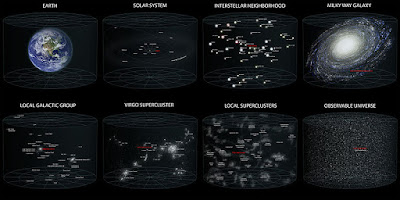" I think that it's important for scientist to explain their work, particularly in cosmology. This is now answers many questions once asked of religion" -Stephen Hawking.
Our universe is the most mysterious place, which is bound by two extraordinary things 'Time' and 'Space'. In this Space-time all matter and energy created which include planets, moons, star, nebula, galaxies, Blackhole etc. The exact size of our entire universe is still unknown.
The metric expansion of space is the increase of the distance between two distant parts of the universe with Time. It is an intrinsic expansion where by the scale of space itself changes, carrying the early universe with it as it grew. It is assumed by observation that galaxies are distributed uniformly in all direction, meaning that our universe has neither an edge nor a center. Discoveries in this century have suggested that our Universe had a beginning from nothing and it is expanding at an increasing rate. Which is more mysterious. The majority of mass in our Universe appears to exist in an unknown form known as Dark Matter.
But the earliest scientific models of the Universe were developed by ancient Greek and Indian philosophers and were geocentric, placing Earth at the centre of the Universe. Over the centuries, more precise astronomical observations led Nicolaus Copernicus to develop the Heliocentric model with the Sun at the centre of the Solar System. Further observational improvements led to the realization that our solar system is located in the Milky Way Galaxy, which is one of many galaxies in our Universe. And all started from a single event known as Big Bang.
According to Big Bang theory, Space and time emerged together 13.799 billion years ago, and all fixed amount of energy and matter has become less dense as the Universe has expanded. After the initial expansion, the Universe cooled, allowing the first subatomic particles to form and then simple atoms. Giant clouds later merged through gravity to form galaxies, stars, and everything else seen today. It is possible to see object that are now further away than 13.799 billion light-years because space itself has expanded. This means that object which are now 46 billion light years away can still be seen in their distant past, because at that time they were much closer to us.
There are many competing hypotheses about the ultimate fate of the Universe and about what, if anything, preceded the Big Bang, while other physicists and philosophers refuse to speculate, doubting Big Bang theory. Some physicists have suggested various multiverse hypotheses, in which the Universe might be one among many Universes that exist. From here new theory emerge, like String Theory. String Theory allow us to mix Einstein's 'theory of relativity' with 'quantum physics'. Hence we can compare atoms and string's behaviour with stars and galaxie's behaviour in Space-time curvature. We speculate and calculate new possibilities like higher dimensions, super string, worm holes, white holes, Higgs Boson, multiverse, parallel Universe and many more. Our science explain that Time can play tricks with us, and Space-time curvature made our universe mysterious and farther complicative.
But talking about the birth of Science, We the human of planet Earth divided our Science into three parts, Physical science, Chemical science and Biological science. We raised tons of questions throughout in our short human history. Some of them are scientific and others are philosophical. Questions like what is the purpose of life? how Big Bang happened? How life on earth formed? Why we leave in a perfect planet, in a perfect Galaxy which in a perfect Universe? How our Brain works? Science are hunting answer for every puzzle ever asked and giving us extraordinary conclusions.
We'll periodically discuss more on those topic later. But first collaborate for this magnificent journey of Science. We'll debate every possibility impartially. We'll create a better Scientific society by asking questions.







No comments:
Post a Comment